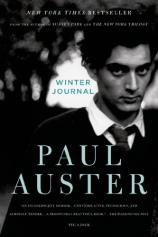Winter Journal
Review
Winter Journal
The winter of 2010-2011 delivered more than five feet of snow and a host of other meteorological insults to New York City. It’s not surprising that the enforced confinement brought on by that onslaught put Paul Auster in a reflective mood on the eve of his 64th birthday. The result is WINTER JOURNAL, an idiosyncratic memoir that is at times cerebral, at times bawdy, and in every sense consistently rewarding, from a man who has spent his life “bleeding words onto a page.”
Auster's selection of his narrative voice seems risky at first, but it’s one that ultimately enhances the uncanny power of the book. He presents his reminiscences in the second person, and while we understand he’s describing people and experiences that have shaped his life, it’s impossible, especially for a reader anywhere close to Auster’s age, to resist the subtle invitation to engage in similar excavations of memory. That sense of identification wells up from the book’s first paragraph:
“You think it will never happen to you, that it cannot happen to you, that you are the only person in the world to whom none of these things will ever happen, and then, one by one, they all begin to happen to you, in the same way they happen to everyone else.”
"...an idiosyncratic memoir that is at times cerebral, at times bawdy, and in every sense consistently rewarding... Whether you experience what Auster calls the 'journey through winter' literally or figuratively, this book will serve as a worthy companion when you embark on it.
From there, the story proceeds in an episodic, impressionistic fashion, true to its title as the record of the author’s musings through one bleak winter. Auster is an inveterate listmaker of everything from his scars (“you understand that they are marks of life, that the assorted jagged lines etched into the skin of your face are letters from the secret alphabet that tells the story of who you are”), to his brushes with “a number of potentially absurd, nonsensical deaths,” to the 21 residences he’s occupied from his birth in East Orange, New Jersey in 1947 to his current home in a four-story brownstone he shares with his wife, the writer Siri Hustvedt, in Park Slope, Brooklyn.
That catalog of domesticity consumes some 54 of the book’s 230 pages, but it’s far from tedious, instead allowing Auster to discourse on subjects as diverse as his encounter with French anti-Semitism, the erratic course of his romantic life, and the birth of his writing career. Whether (as seems likely) he kept a meticulous record of these events, or merely possesses a prodigious memory, his stories overflow with precise, closely-observed detail, delivered in seductive prose whose tone ranges from darkly comic to frankly grim.
Despite that near-perfect recall, Auster recognizes the constraints imposed on even the most acute narrator when recounting the story of one’s life: “Some memories are so strange to you, so unlikely, so outside the realm of the plausible, that you find it difficult to reconcile them with the fact that you are the person who experienced the events you are remembering.”
He devotes considerable attention to his annus horribilis of 2002, what he calls his “year of grim surprises.” In those 12 months his mother died suddenly, an event that brought forth no tears, but rather a panic attack where he recalls that “you lay on the floor and howled, howled at the top of your lungs, howled because death was inside you and you didn’t want to die.” He suffered a blood clot in his leg and a damaged cornea, and caused a car accident that nearly killed his wife. Death in all its forms hovers over these events, a persistent, uninvited guest.
Perhaps it’s his recognition of how close he came to losing her that prompts his tender tribute to Hustvedt, his wife of 30 years. Whether it’s his affinity for the quaint Christmas customs of her Minnesota-resident Norwegian family (“food as ritual, as continuity, as family cohesion --- a symbolic anchor to prevent you from drifting out to sea”) or his description of her as “a brilliant woman, one of the best minds you had ever met,” Auster candidly acknowledges the good fortune that brought them together: “You didn’t deserve it, but neither did you not deserve it. It just happened, and nothing can account for what happened to you except luck.”
As this review is being written, amid the dog days of August, it requires a determined act of imagination to conjure up the feeling of the icy winds that will blow a few short months from now. Whether you experience what Auster calls the “journey through winter” literally or figuratively, this book will serve as a worthy companion when you embark on it.
Reviewed by Harvey Freedenberg on August 24, 2012
Winter Journal
- Publication Date: December 17, 2013
- Genres: Nonfiction
- Paperback: 240 pages
- Publisher: Picador
- ISBN-10: 125000909X
- ISBN-13: 9781250009098





